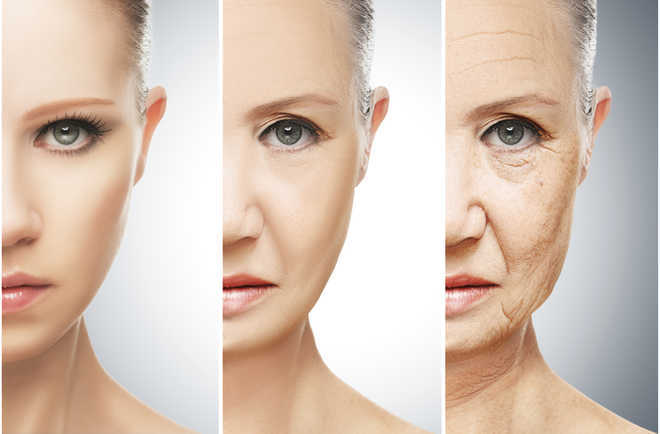
Photo: Thinkstock
Washington
Scientists, including one of Indian origin, have successfully reversed hair loss and wrinkled skin—the hallmarks of ageing—in mice, paving the way for treating age-related disorders in humans.
When a mutation leading to mitochondrial dysfunction is induced, the mouse develops wrinkled skin and extensive, visible hair loss in a matter of weeks.
When the mitochondrial function is restored by turning off the gene responsible for mitochondrial dysfunction, the mouse returns to smooth skin and thick fur, indistinguishable from a healthy mouse of the same age.
"To our knowledge, this observation is unprecedented," said Keshav Singh, a professor at University of Alabama at Birmingham in the US.
The mutation that does this is in a nuclear gene affecting mitochondrial function, the tiny organelles known as the powerhouses of the cells.
Numerous mitochondria in cells produce 90 per cent of the chemical energy cells need to survive.
In humans, a decline in mitochondrial function is seen during ageing, and mitochondrial dysfunction can drive age-related diseases.
A depletion of the DNA in mitochondria is also implicated in human mitochondrial diseases, cardiovascular disease, diabetes, age-associated neurological disorders and cancer.
"This mouse model should provide an unprecedented opportunity for the development of preventive and therapeutic drug development strategies to augment the mitochondrial functions for the treatment of ageing-associated skin and hair pathology and other human diseases in which mitochondrial dysfunction plays a significant role," Singh said.
The mutation in the mouse model is induced when the antibiotic doxycycline is added to the food or drinking water. This causes depletion of mitochondrial DNA because the enzyme to replicate the DNA becomes inactive.
In four weeks, the mice showed gray hair, reduced hair density, hair loss, slowed movements and lethargy, changes that are reminiscent of natural ageing. Wrinkled skin was seen four to eight weeks after induction of the mutation, and females had more severe skin wrinkles than males.
This hair loss and wrinkled skin could be reversed by turning off the mutation.
Little change was seen in other organs when the mutation was induced, suggesting an important role for mitochondria in skin compared to other tissues.
The wrinkled skin showed changes similar to those seen in both intrinsic and extrinsic ageing - intrinsic ageing is the natural process of ageing, and extrinsic ageing is the effect of external factors that influence ageing, such as skin wrinkles that develop from excess sun or long-term smoking.
Among the details, the skin of induced-mutation mice showed increased numbers of skin cells, abnormal thickening of the outer layer, dysfunctional hair follicles and increased inflammation that appeared to contribute to skin pathology. These are similar to extrinsic ageing of the skin in humans.
The mice with depleted mitochondrial DNA also showed changed expression of four ageing-associated markers in cells, similar to intrinsic ageing.
The mitochondria of induced-mutation mice had reduced mitochondrial DNA content, altered mitochondrial gene expression, and instability of the large complexes in mitochondria that are involved in oxidative phosphorylation.
Reversal of the mutation restored mitochondrial function, as well as the skin and hair pathology. This showed that mitochondria are reversible regulators of skin ageing and loss of hair, an observation that Singh calls "surprising".
"It suggests that epigenetic mechanisms underlying mitochondria-to-nucleus cross-talk must play an important role in the restoration of normal skin and hair phenotype," Singh said. PTI



























